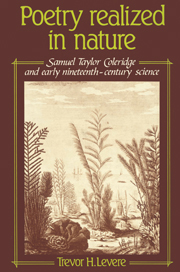Book contents
- Frontmatter
- Contents
- Preface
- Introduction: nature and mind
- CHAPTER 1 Early Years: From Hartley to Davy
- CHAPTER 2 Surgeons, Chemists, and Animal Chemists: Coleridge's Productive Middle Years From the Biographia Literaria to Aids to Reflection
- CHAPTER 3 Two Visions of the World: Coleridge, Natural Philosophy, and the Philosophy of Nature
- CHAPTER 4 Coleridge and Metascience: Approaches to Nature and Schemes of the Sciences
- CHAPTER 5 The Construction of the World: Genesis, Cosmology, and General Physics
- CHAPTER 6 Geology and Chemistry: The Inward Powers of Matter
- CHAPTER 7 Life: Crown and Culmination
- Notes
- Index
CHAPTER 6 - Geology and Chemistry: The Inward Powers of Matter
Published online by Cambridge University Press: 09 October 2009
- Frontmatter
- Contents
- Preface
- Introduction: nature and mind
- CHAPTER 1 Early Years: From Hartley to Davy
- CHAPTER 2 Surgeons, Chemists, and Animal Chemists: Coleridge's Productive Middle Years From the Biographia Literaria to Aids to Reflection
- CHAPTER 3 Two Visions of the World: Coleridge, Natural Philosophy, and the Philosophy of Nature
- CHAPTER 4 Coleridge and Metascience: Approaches to Nature and Schemes of the Sciences
- CHAPTER 5 The Construction of the World: Genesis, Cosmology, and General Physics
- CHAPTER 6 Geology and Chemistry: The Inward Powers of Matter
- CHAPTER 7 Life: Crown and Culmination
- Notes
- Index
Summary
Beddoes and Darwin, Werner and Hutton
Coleridge, in the year before his death, had come to see geological debates as of the most fundamental importance. “Since the controversy between the Realists and Nominalists of the 13th, and 14th Centuries, there has been … no more important Question – than that … of the German & thence the French Hypothesis of a progressive Zoogony, (and of course, a Geogony, with its successive Epochs & their Catastrophes; and of its English opponents, Lyell … &c.” He had not always been so impressed with the importance of geology, which he first encountered in the persons and writings of Darwin and Beddoes. Coleridge, disputing with Darwin in Derby in 1796, learned that he had adopted James Hutton's theory. Not long previously, Coleridge had read Darwin's Botanic Garden, which evinced a partly Wernerian stance toward the theory of the earth. His encounter with Darwin came shortly after his first meeting with Beddoes, who was in the habit of addressing combative geological letters to his friend and fellow physician Darwin. Beddoes had studied at Edinburgh in the 1780s, when Hutton's theory was becoming known there. Beddoes's publications and lecture notes following his removal to Oxford show him as indebted to both Werner and Hutton. His lectures were essentially Wernerian, his papers Huttonian. Coleridge had certainly encountered the debate between the two schools of geology by 1796.
- Type
- Chapter
- Information
- Poetry Realized in NatureSamuel Taylor Coleridge and Early Nineteenth-Century Science, pp. 159 - 200Publisher: Cambridge University PressPrint publication year: 1981

